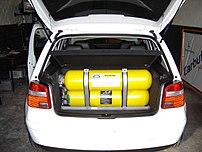 Image via Wikipedia
Image via Wikipedia
What is Compressed Natural Gas? by Levi Quinn
Compressed natural gas or CNG is just one among many other fuel sources that could be a great alternative to fossil fuels. It is a name that many people will not be familiar with though it has likely been mentioned in accordance with other fossil fuel alternatives.
There are many misconceptions about the use of CNG. Gathering information so that you can understand is important when it comes to making a fuel choice as a consumer. Doing our part to help the environment is essential but it must start with the proper information. Finding the best solution for the earth is a team task.
The use of compressed natural gas is a better alternative than regular gas. When it is combusted it does give off toxic emissions but they are much lower than those that occur with regular gasoline. The use of CNG is also a lot safer, especially in the event of a spill or accident. There are many helpful diagrams explaining the use and production of compressed natural gas via resources such as Wikipedia. It might help some to understand it much better in a diagram format.
Compressed natural gas is created when natural gas is compressed to less than 1% of its original volume. That is a huge difference. In order for it to stay this way it has to be stored in a particular manner. It is usually encased in cylinder shaped containers that must be kept at a level of 2900 to 3200 psi. Once the CNG is put into this alternative form, it can be used as a power source for vehicles. Traditional gasoline cars must be converted in order to run Biofuel before this can be done. However, once it is, there is nothing else required to use CNG.
With study it has been determined that compressed natural gas can be used in virtually anything that needs to be powered. From everyday vehicles to public transport like buses or trains, it has been proven to be less harmful to the environment and fully functional for producing energy. Many towns and cities have begun experimenting with the use of CNG in their public vehicles.
Like anything, compressed natural gas does have fallbacks. It does have toxins within the emissions given off. This makes it an alternative that still is not as good as others that do not give off toxins. It also requires much more storage space than regular fuel which often means that you have to create additional storage space in your trunk or build an additional tank under the car. Many consumers will find that it just isn't worth the hassle or the cost. With other and possibly better fuel sources such as ethanol or biodiesel, there may not be enough room in the marketplace for compressed natural gas.
Of course, nothing is certain as things are constantly changing in the world of fossil fuel alternatives. It is up to each individual to form their own opinions and to do the research necessary to do so.
Are you putting off reviewing or changing your car insurance coverage? Visit AutoInsuranceRatesDirect.com today for information on how to determine what coverage you need, then find it at a good price. Insure your whole family.
Article Source: http://EzineArticles.com/?expert=Levi_Quinn
http://EzineArticles.com/?What-is-Compressed-Natural-Gas?&id=2034047![Reblog this post [with Zemanta]](http://img.zemanta.com/reblog_e.png?x-id=d176a559-ac80-4367-8bf9-20e6c454f970)
No comments:
Post a Comment